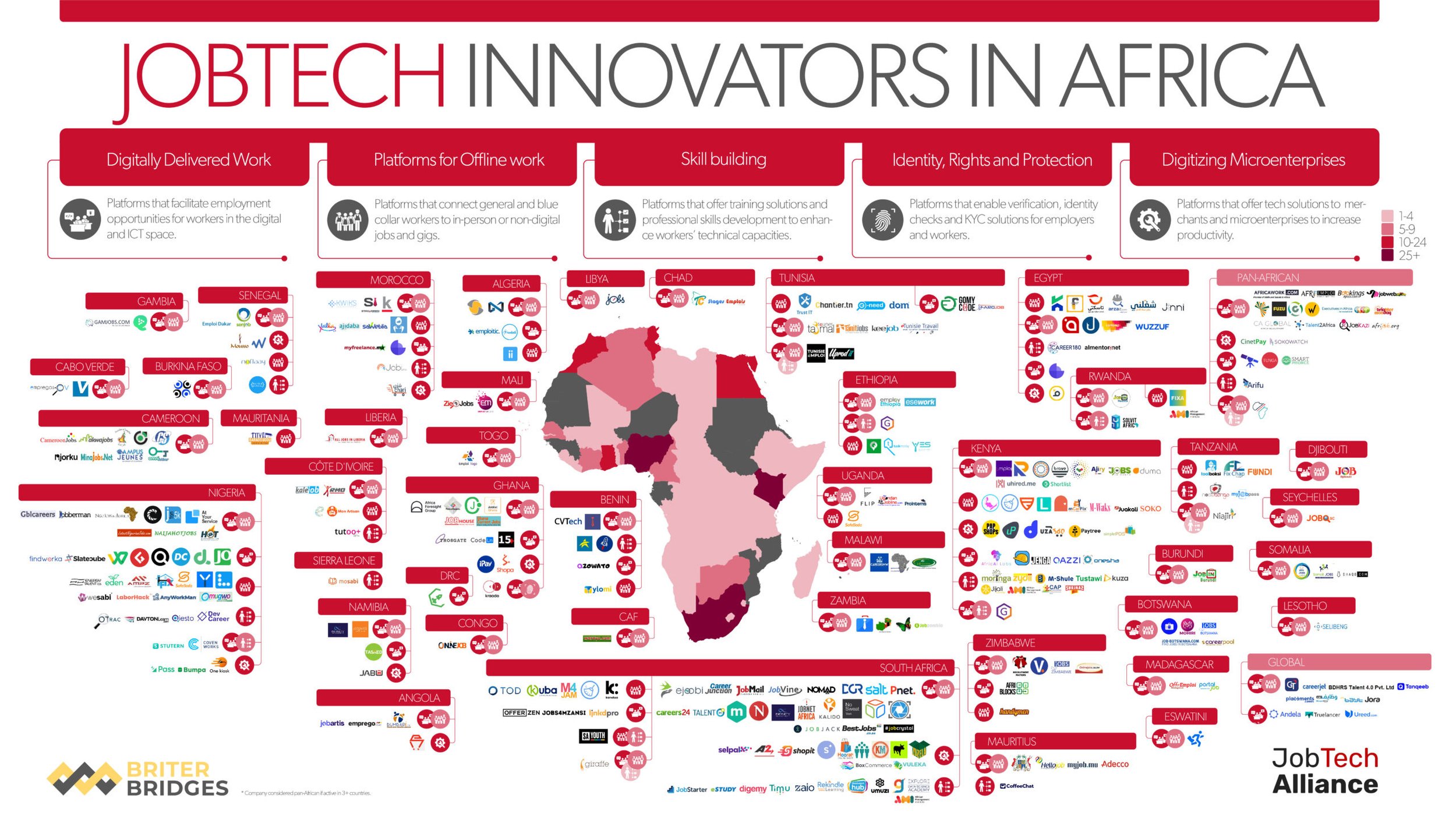Jobtech in Africa: expanding access to employment
A partnership with the Jobtech Alliance
Africa’s socio-economic growth is characterised by a double-edged sword in that the fastest-growing population in the world meets one of the highest levels of unemployment. Because of this, the creation of long-lasting and sustainable work opportunities is becoming all the more pressing, especially as the ongoing COVID-19 pandemic has had devastating effects on the already high unemployment on the continent. Sustainable Development Goal (SDG) 8: ‘Employment, decent work for all and social protection’ is at the forefront of the discussion to ensure that all workers, especially rural workers, youth and informal workers, are given equal opportunities, included in economic progress, and protected through labour laws. This mapping is aimed at raising awareness on and providing a framework to analyse the several innovations that are contributing to increasing access to employment through a variety of models ranging from information providers to marketplaces for talents. These models are gathered under the umbrella term ‘jobtech’.
Disrupting the traditional models of the job market are several technology-driven and innovative solutions bringing to light more opportunities and enabling larger segments of the population to obtain decent work. According to the Jobtech Alliance, jobtech can be defined as the “use of technology to enable, facilitate, or improve the productivity of people to access and deliver quality work”. This digital evolution of the job search process has been facilitated by record levels of internet penetration and smartphone adoption across the continent, allowing individuals, and youth, in particular, to more easily find short and long-term contracts. Although digital job boards are helping connect job-seekers to employment opportunities and recruiters to qualified candidates, the notion of jobtech can also be extended beyond the mere job matching functions into the realm of education and upskilling, and the enabling of a more employable and adept workforce. Numerous e-learning platforms and training centres are adapting their services to the growing number of job seekers looking to participate in an increasingly competitive job market, offering courses to enhance professional capabilities and technical skills. In fact, more and more sectors can now be associated with the very concept of jobtech, generating new opportunities for work and professional growth, and closing the skill and productivity gap. E-commerce, fintech and logistics can also be seen to intersect with the concept of jobtech, as they are directly and indirectly facilitating jobs for microenterprises, merchants and informal workers. This synthesis of sectors could stem from a need to build out stronger value chains, ensuring for instance that individuals have the necessary tools and resources needed to be able to meet the requirements of their work and employment. Sokowatch, Marketforce for instance, connects informal retailers to stock management and financing, and Safeboda, Gokada, Max, Uber, and Bolt link ‘boda’ drivers to training and a ride-hailing community.
The ability of new companies to include segments of workers that would otherwise not be looking for a job via boards or formal directories is opening up the possibility for individuals that were hitherto less exposed to the market to access more opportunities. Yet, a paradox persists in that unemployment on the continent is also closely tied to illiteracy and lack of awareness of what dynamics regulate the job market, and companies innovating this sector through digital technology need to invest in distribution channels that allow them to tap into these very demographics, otherwise, they risk only addressing an already tapped-into demographic segment instead of broadening the opportunity pool for the hard-to-reach.
Yet, unlike the rapidly growing industries of fintech or e-commerce, the concept of jobtech is still relatively nascent. That said, the potential for social and economic impact is immense, and the jobtech model is slowly gaining traction from local and international institutions and investors, and from the beginning of 2019 until October 2021, job board platforms across Africa raised more than $19.4 million dollars in disclosed deals, a significantly small proportion of total funding for the same timeframe. This might also be due to the fact that the human resources and recruitment industry is quite established and the figure might be skewed and unable to provide an objective overview of this market. Companies affiliated with jobtech, such as Sokowatch, are often considered under other sectors when tracking investments, however, if considered in the jobtech space raise the total sum of funding to the space significantly.
Earlier this year, Briter, MercyCorps, and the Jobtech Alliance joined forces to map out the jobtech landscape across Africa. A total of 323 active innovators were identified, categorised into 5 distinct clusters:
Digitally delivered work (solutions facilitating online work and tasks, such as online freelance gigs like graphic design or microwork);
Platforms for offline work (platforms connecting individuals to physical work opportunities, including gigs like household maintenance services or full time jobs);
Skill-building (tools and software for connecting individuals to professional skills development courses and training);
Identity, rights and protection (solutions which enhance professional rights or quality of work, such as tools verifying professional identity, facilitating collective bargaining, or providing portable benefits);
Digitising microenterprises (solutions that connect micro-enterprises and the informal workforce to formal markets and supply chains).
The above categorisation and mapping of jobtech seeks to encompass a broad spectrum of job enabling and facilitating solutions, while also allowing for a clear distinction between the types of services offered.
In practice, we find that the vast majority of the startups and SMEs offer a combination of solutions, especially digitally delivered work and platforms for offline work, e.g., e.g. Kwiks in Morocco, Wuzzuf in Egypt and Shortlist in Kenya. Platforms for offline work by themselves have also become prevalent in many African countries, connecting blue-collar and informal workers to employment, such as SweepSouth in South Africa, or Shaghalni in Egypt. Skill-building solutions, often sitting between education and professional development, are becoming an increasingly accessible by means of filling knowledge or skills gaps and strengthening employability in a continuously evolving job market. DevCareer in Nigeria, and Tutoo+ in Côte d'Ivoire for instance, are helping users develop skills in technology and software to increase their employment prospects in the field of ICT. The share of identity, rights and protection focused solutions is disproportionately small compared to trends seen in other markets, indicating an area that might evolve once the jobtech ecosystems mature and become more established. Digitising microenterprises is becoming more and more integrated across verticals, promising greater inclusion of small and informal businesses.
The jobtech landscape can play a pivotal role in closing productivity and skills gaps, increasing employment opportunities, and bringing formality to otherwise informal sectors. However, as jobtech is a comparatively nascent sector to other well-established industries in the field of tech, there is a lot to be gained from building a stronger support ecosystem and an arena for partnerships and collaborations, so as to maximise the growth potential of the solutions. By creating more awareness around the needs and potential of the space, the Jobtech Alliance is taking the first step towards more inclusive and impactful jobtech.
If you’re interested in the jobtech space and how it is developing, find out more and join the Jobtech Alliance at:https://jobtechalliance.com/register/
Find here our previous #InnovationMaps looking at jobs platforms on the continent*
*The map does not guarantee 100% comprehensive and it is aimed at showing the diversity of the landscape.



